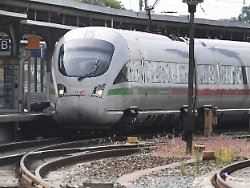The corona crisis also plunges Deutsche Bahn into distress. A drop in the number of passengers leads to high losses. Something good goes hand in hand with the difficult first half of the year: trains arrive on time more frequently than they have for a long time.
In the Corona crisis, there are still significantly fewer people traveling by train than usual – but they are arriving on time as punctually as they have not been for years. In the first half of this year, an average of 83.5 percent of Deutsche Bahn's long-distance trains were on time, as the federally-owned company announced. "Of course, the small number of trains during the Corona crisis also contributed to the significant increase in punctuality," it said. According to this, the utilization in long-distance transport is recovering only slowly and is currently around 30 percent on average. In the meantime, passenger numbers had dropped by up to 90 percent.
However, significant improvements in construction site management, faster repair of trains and generally fewer disruptions to the infrastructure would also have contributed to the improvement. "Larger halls, expanded workshops and new treatment and storage sidings ensure that the trains can be serviced faster and better and can therefore be brought back into operation faster." In the meantime, 49 trains of the new ICE 4 series have also been deployed.
The Deutsche Bahn said that the last time in 2008 was as punctual as in the first six months of this year. Last year, the punctuality rate in the same period was only 77.2 percent. A train is considered punctual if it arrives at the destination no more than six minutes behind the schedule.
The low occupancy rate helps make long-distance transport run more reliably. However, because the supply was reduced by a maximum of a quarter in the crisis, the group incurred high losses. A hearty austerity program and billions in government aid are the result. However, the group wants to hold on to investments in infrastructure and staffing. "This year alone, around 12.2 billion euros will go into maintaining and expanding the network, train stations and energy systems," it said.
.
